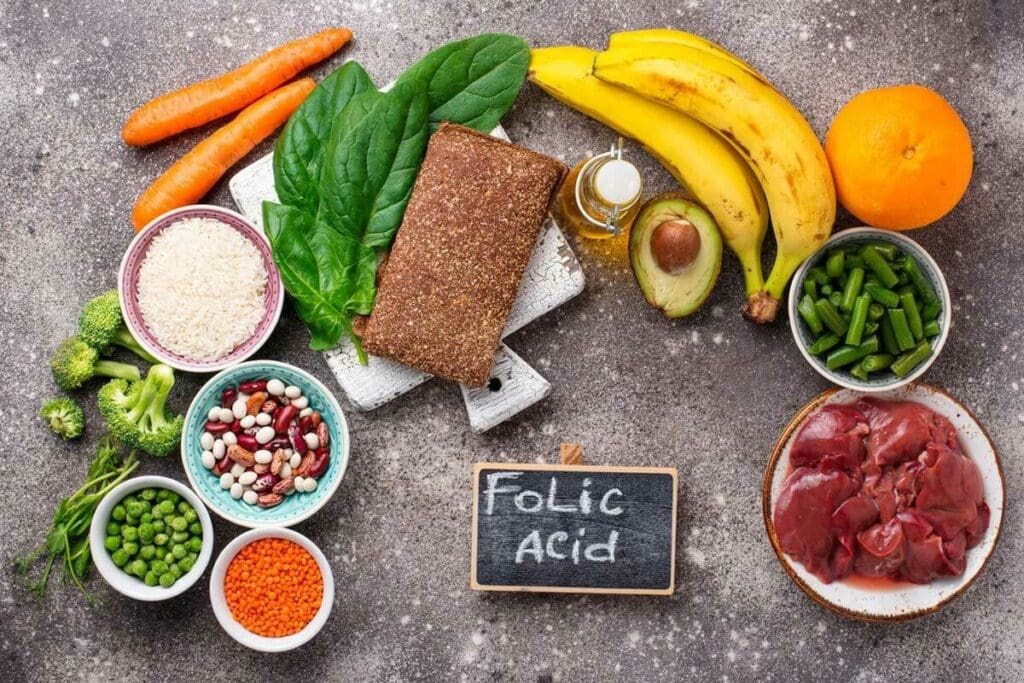Last Updated on November 17, 2025 by Ugurkan Demir

At Liv Hospital, we know how hard nutritional problems can be. Understanding lack of folic acid causes is important, as folic acid and vitamin B12 issues are common but often missed. They can really hurt your health.
Folic acid problems can come from not eating enough or health issues. We focus on fixing these problems with detailed care and advice.
We look into why folate levels drop, like drinking too much alcohol, some meds, and diseases like celiac. Knowing these reasons helps us find better ways to help our patients.

Folate and Vitamin B12 are key nutrients for our bodies. They help with DNA making, red blood cell creation, and keeping our nervous system healthy.
Folate, or Vitamin B9, is a water-soluble vitamin. It’s vital for making DNA and RNA. It also helps fix and change DNA, which is important for cells to work right.
Vitamin B12 is important for our nervous system and making red blood cells. It helps break down fats and proteins. It’s mainly absorbed in the terminal ileum of the small intestine. This process needs intrinsic factor, a stomach protein. Knowing where Vitamin B12 is absorbed helps find absorption problems.
Folate and Vitamin B12 need each other to function. A lack of one can harm the other, causing health problems. For example, not enough Vitamin B12 can make folate less effective. It’s important to understand how they work together to fix deficiencies, like vitamin B12 deficiency and the role of b12 intrinsic factor.

Folic acid is key for our bodies, helping with DNA and cell growth. Not having enough can cause serious health problems. It’s important to know why this happens.
Eating too little folate is a big reason for deficiency. Foods like leafy greens and whole grains are full of it. But, many of us don’t eat enough of these. Eating a balanced diet with plenty of folate is a good start.
Drinking a lot of alcohol can also cause folate problems. Alcohol makes it hard for our bodies to use folate. Drinking less is key to keeping folate levels up.
Some medicines can mess with how our bodies use folate. This includes drugs for seizures and some treatments for cancer. If you’re on meds, talk to your doctor about how they might affect folate.
Some people need more folate, like pregnant women or those with certain health issues. Pregnancy, for example, means the body needs more folate for the baby. Making sure to get enough folate during these times is important.
Knowing why we might not have enough folate helps us stay healthy. By changing our diet and lifestyle, we can avoid folate deficiency.
Vitamin B12 absorption is a complex process involving several steps and organs. It’s essential for making red blood cells and keeping the nervous system healthy.
Vitamin B12 is absorbed in the terminal ileum, the last part of the small intestine. This spot is key for absorption, providing the right environment and receptors.
Intrinsic factor is a stomach lining protein vital for vitamin B12 absorption. It helps bind vitamin B12 in food, making it easier to absorb in the terminal ileum. Without it, vitamin B12 absorption fails, leading to deficiencies.
Vitamin B12’s journey from food to cells is complex. It starts in the stomach, where it’s released from food. Then, it binds with intrinsic factor, forming a complex absorbed in the terminal ileum.
After absorption, vitamin B12 goes to the liver via the bloodstream. There, it’s stored and distributed to cells as needed.
Knowing how vitamin B12 is absorbed shows the importance of a healthy digestive system and intrinsic factor. Any issues can cause deficiencies. This stresses the need for a balanced diet and, if needed, supplements.
Intrinsic factor deficiency is a big reason for vitamin B12 malabsorption. This leads to health problems. Vitamin B12 is key for making red blood cells, nerve function, and DNA. Without enough, the body can’t work right, causing health issues.
Intrinsic factor is a protein made by the stomach’s lining. It’s very important for vitamin B12 absorption. It helps bind vitamin B12 for absorption in the small intestine. Without it, vitamin B12 can’t be absorbed, causing deficiency.
Pernicious anemia is an autoimmune disease. It destroys stomach cells that make intrinsic factor. This makes it hard for the body to absorb vitamin B12, leading to deficiency. It’s a big cause of vitamin B12 deficiency and can cause serious health problems if not treated.
The link between intrinsic factor and vitamin B12 absorption is key. Not having enough intrinsic factor makes it hard to absorb vitamin B12. This can cause tiredness, weakness, and other health issues. Knowing this connection helps diagnose and treat vitamin B12 deficiency.
To diagnose intrinsic factor deficiency, tests for intrinsic factor antibodies and vitamin B12 levels are done. Treatment usually involves vitamin B12 shots to avoid needing intrinsic factor. Treating pernicious anemia and intrinsic factor deficiency needs a full plan to fix the deficiency and its causes.
Intrinsic factor deficiency is a known cause of vitamin B12 malabsorption. But, other gastrointestinal issues can also affect B12 absorption. Vitamin B12 is key for making red blood cells, nerve function, and DNA synthesis. So, knowing what affects its absorption is important for health.
Gastric conditions can really hurt vitamin B12 absorption. Gastric atrophy makes the stomach lining thin, reducing acid and intrinsic factor. Also, gastric surgery can change the stomach’s shape and reduce B12 absorption.
Helicobacter pylori infection can cause chronic gastritis and lower B12 absorption. A gastroenterologist noted, “The presence of H. pylori can significantly alter the gastric environment, making it less conducive to vitamin B12 absorption.”
“The stomach’s role in vitamin B12 absorption is often underestimated. Conditions like gastric atrophy and H. pylori infection can have a profound impact on our ability to absorb this essential nutrient.”
Intestinal conditions also affect vitamin B12 malabsorption. Diseases like Crohn’s disease and celiac disease damage the intestinal lining. This reduces the area for B12 absorption. Also, bacterial overgrowth in the small intestine can compete with B12, lowering its absorption.
These conditions show how important a healthy intestinal environment is for nutrient absorption.
Pancreatic insufficiency can also lead to vitamin B12 malabsorption. The pancreas makes enzymes needed for nutrient digestion and absorption, including B12. If the pancreas doesn’t work right, B12 absorption can suffer.
Conditions like chronic pancreatitis and pancreatic exocrine insufficiency reduce enzyme production. This affects B12 absorption. Understanding the complex relationship between gastrointestinal conditions and nutrient absorption is key to treating B12 deficiency.
Gastrointestinal conditions play a big role in how we absorb nutrients. Certain disorders can make it hard to get enough folate and B12. It’s important to know how these conditions affect our health.
Celiac disease is a chronic autoimmune disorder that mainly affects the small intestine. It leads to malabsorption of nutrients. When people with celiac disease eat gluten, it damages the small intestine’s villi, making it hard to absorb folate and vitamin B12. Early diagnosis and sticking to a gluten-free diet are key to managing the condition and improving nutrient absorption.
Celiac disease can have a big impact on nutrient absorption. Studies show that untreated celiac disease can cause folate and vitamin B12 deficiencies. It’s important to regularly check nutrient levels and adjust the diet as needed to manage celiac disease.
Inflammatory bowel disease (IBD), including Crohn’s disease and ulcerative colitis, can greatly affect nutrient absorption. The inflammation caused by IBD can damage the gastrointestinal tract’s lining, making it hard to absorb essential nutrients. The severity and location of the inflammation can affect how much nutrient malabsorption occurs.
IBD can lead to folate and vitamin B12 deficiencies. This is due to several factors, including reduced intake, malabsorption, and increased body utilization. Personalized nutritional support and managing IBD are key to reducing the risk of deficiencies.
| Condition | Impact on Folate Absorption | Impact on B12 Absorption |
| Celiac Disease | Impaired due to villi damage | Impaired due to reduced intrinsic factor production |
| Inflammatory Bowel Disease | Variable, depending on disease location and severity | Impaired, specially if terminal ileum is affected |
Surgical interventions in the gastrointestinal tract, like gastric bypass surgery or resection of parts of the intestine, can greatly affect nutrient absorption. These procedures can change the digestive system’s anatomy and physiology, potentially leading to folate and vitamin B12 deficiencies. Understanding the nutritional consequences of these surgeries is important for effective post-operative care.
Patients who have had gastrointestinal surgery need careful nutritional monitoring and supplementation as needed to prevent deficiencies. Tailored nutritional support can help reduce the risk of folate and vitamin B12 deficiencies after surgery.
Even if blood tests show normal vitamin B12 levels, a functional deficiency can happen. This is because of problems at the cellular level. It shows that blood tests alone are not enough to check vitamin B12 levels.
A functional vitamin B12 deficiency means the body can’t use vitamin B12, even if it has enough in the blood. This can cause health problems because vitamin B12 is key for energy, nerve health, and making red blood cells.
There are many reasons for this deficiency. These include problems with how cells take in and use vitamin B12. We’ll look at these reasons in more detail.
Vitamin B12 must be absorbed and carried into cells to work. Any problem in this process can cause a deficiency. Important factors include:
Genetics play a big role in how we metabolize vitamin B12. Some genetic changes can affect the enzymes and proteins needed for vitamin B12 processing. This can lead to a deficiency, even with enough vitamin B12 in the diet or normal blood levels.
For example, changes in the MTHFR gene can impact how folate is converted into its active form. This is important for vitamin B12 metabolism. Knowing about these genetic factors helps in diagnosing and treating functional B12 deficiency.
Key genetic factors include:
By understanding genetic factors and cellular problems, doctors can better diagnose and treat functional vitamin B12 deficiency. This improves patient care.
When B12 levels are normal but folate is low, it’s a tricky situation. We must find out why to give the right treatment.
Figuring out the cause of low folate with normal B12 is key. Several things can cause this, including:
For more on why you might not have enough vitamin B12 or folate, check out NHS.uk.
Low folate with normal B12 levels means we need to find the cause. This can lead to serious health problems, such as:
Knowing how to treat low folate with normal B12 is important. Treatment usually includes:
Managing this condition well means looking at both the deficiency and what’s causing it.
Vitamin B12 is key for our health. It’s stored in the liver, which is vital for managing deficiency. Knowing how long it stays in the body is important.
The liver holds about 50-60% of our vitamin B12. When we eat foods or take supplements with B12, it goes to the liver. This storage is essential, helping us when we don’t get enough B12.
Key factors influencing vitamin B12 storage in the liver include:
Several things can change how long B12 stays in our bodies. These include:
A study in a medical journal said, “Vitamin B12 deficiency is common, mainly in older adults. Knowing how it’s stored and retained is key for managing it.”
“The liver’s ability to store vitamin B12 is significant, but it can be depleted over time if dietary intake is inadequate or absorption is impaired.”
Knowing how long B12 stays in the body is important for doctors. Patients with deficiency might need long-term supplements. Those with conditions affecting absorption should be closely monitored.
Managing B12 deficiency requires a tailored approach. We must consider diet, absorption, and health when treating it.
Treating folate and vitamin B12 deficiencies needs a complete plan. This plan includes diet changes, supplements, and finding the root cause. Each person’s needs are different, so a tailored approach is best.
Eating the right foods is key to managing these deficiencies. For folate, eat more leafy greens, legumes, and fortified cereals. For vitamin B12, add foods like meat, fish, poultry, eggs, and dairy to your diet.
It’s wise to get help from a healthcare provider or dietitian for a meal plan. They’ll consider your food likes, dislikes, and health needs.
Supplements are often needed to fix these deficiencies. For folate, folic acid supplements are used. For vitamin B12, you might take pills or get shots, depending on your needs.
| Deficiency Type | Supplementation Form | Administration Route |
| Folate Deficiency | Folic Acid | Oral |
| Vitamin B12 Deficiency | Cyanocobalamin or Methylcobalamin | Oral or Intramuscular Injection |
Finding and treating the causes of these deficiencies is vital. This might mean treating other health issues, changing medications, or managing gut problems.
People with celiac or Crohn’s disease might need treatment for better nutrient absorption. Those on certain meds, like metformin or proton pump inhibitors, might need to adjust their meds.
By using a full treatment plan that includes diet, supplements, and treating the cause, you can get your nutrients back in balance. This will help improve your health a lot.
Understanding how to prevent and fix nutrient deficiencies is key. Not getting enough folate and vitamin B12 can harm our health. It’s important to know how these nutrients keep us healthy.
We’ve looked at why we might not get enough folate and B12. This includes eating poorly, drinking too much alcohol, and some health issues. Knowing these reasons helps us take steps to avoid these problems.
To fix nutrient deficiencies, we need more than just supplements and food changes. We also have to tackle the root causes. By doing this, we can stay healthy and avoid other health problems.
Folic acid deficiency can happen due to not eating enough of it, drinking too much alcohol, or taking certain medicines. It can also occur when the body needs more of it. If not treated, it can harm your health.
Vitamin B12 is absorbed in the ileum, the last part of the small intestine. A protein called intrinsic factor, made by the stomach, helps with this process.
Intrinsic factor is a stomach protein that helps vitamin B12 get absorbed in the ileum. Without it, vitamin B12 can’t be absorbed, causing a deficiency.
Low folate levels can happen even with normal vitamin B12 levels. It might be due to diet, some medicines, or health issues that affect folate absorption. Finding the cause is important.
Vitamin B12 is stored in the liver. Its stay in the body depends on diet and health. Even with storage, a deficiency can occur if intake or absorption is low.
Treatment includes changing diet, supplements, and fixing underlying issues. A detailed plan is needed to treat these deficiencies and avoid long-term health problems.
Yes, conditions like celiac disease, inflammatory bowel disease, and surgery can affect folate and vitamin B12 absorption. This can lead to deficiencies if not treated.
Functional vitamin B12 deficiency means the body can’t use vitamin B12 at the cellular level, even with normal blood tests. It can be due to genetics or cellular problems.
Some medicines can block folate and vitamin B12 absorption or use. It’s important to talk to a doctor about any medications to avoid deficiencies.
Yes, vitamin B12 deficiency can lead to pernicious anemia, a decrease in red blood cells. Lack of intrinsic factor is a common cause of this deficiency and anemia.
References:
Subscribe to our e-newsletter to stay informed about the latest innovations in the world of health and exclusive offers!